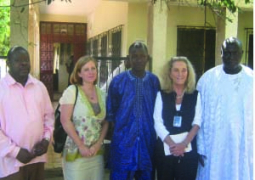
Manzoor Moghal, Author House, 2010.
Idi Amin and the Ugandan Asians
This new book on the devastating Amin tyranny of 1971-1979 stands out among the library of Amin’s rule in that it focuses specifically on the relationship between the late Ugandan despot and the Ugandan Asians in the early 1970s.
For most people in the West Amin was a brutal tyrant whose henchmen sent thousands of Ugandans into early death or despicable exile. Yet, according to the author who hobnobbed with Amin even before he overthrew Milton Obote in 1971, Amin was more a complex character, p.5-6. The author contends that Amin might have been dull and lacklustre before he seized power, but in the eight long years he ruled, he underwent a complete personal metamorphoses, which endeared him to not a few of his fellow African leaders. Indeed, this is why in 1975, he was asked to host and chair the OAU summit despite the terrible violations that he was wreaking on his people.
The author was a well known Ugandan Asian prior to Amin’s rise to power. He contends that when Amin seized power, many Ugandans, especially the business minded Asians were happy because Obote was an inchoate socialist whose policies as poorly enunciated in the ‘Common Man’s Charter’ of 1967, affected the Asians, and many other Ugandans, p.26.
However, as the months rolled on Amin’s disastrous policies began to destroy the economy and soonhe had to find scapegoat for this: The Asians. In late 1972, Amin expelled the Asians from Uganda, and distributed their shops and factories to Africans. The wise Asians must have seen this coming, because as early as 1971, Amin had ordered a head count of all Asians in Uganda, p.83, and the business they owned. This was followed by a General Conference of Asians in Uganda which Amin attended and at which the Asians in Uganda lavished praises on him, p.84. Yet, when he spoke at the Conference he insulted them and accused the Asians of economic crimes. The author attest that Amin had called this conference to test the unity of the Asian community and to discredit the community openly, p.89.
By expelling the Asians, Amin said he was giving back economic power to Africans. He shared the shops, factories, cars of the expelled Asians to his henchmen and cronies. Yet, the fate of the Asians was the befall other categories of people such as the Israelis who were also expelled, and the British. Worst, Amin then turned his anger towards his fellow Africans: thousands of them perished in jails and torture camps in Uganda. Indeed, by the time of his fall in February 1979, thousands of Ugandans had died under his brutal rule, and Uganda was to know instability for another two decade.
This book is an excellent read for any one interested in Amin’s personae, his regime and its many shameful excesses.
Available at Timbooktoo
Tel 4494345.



